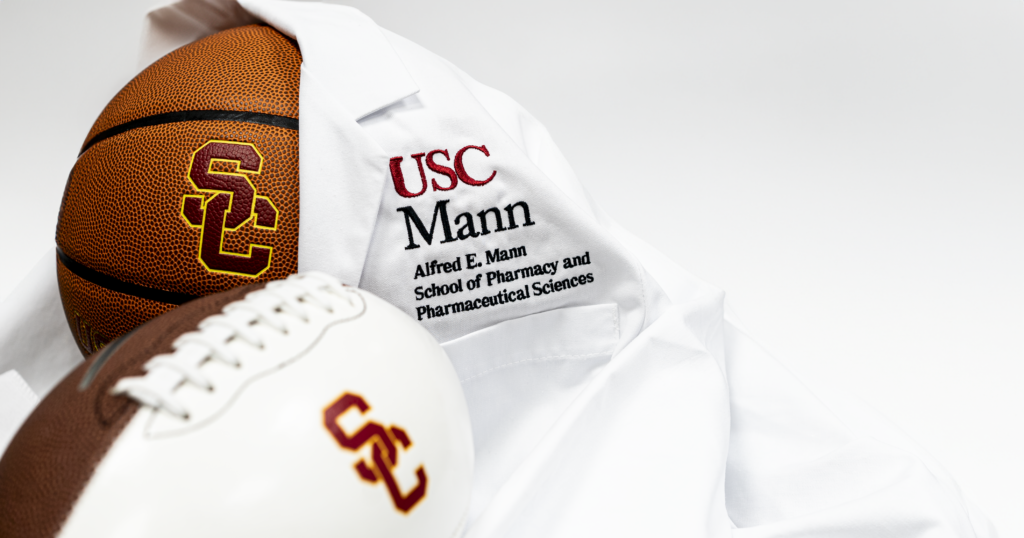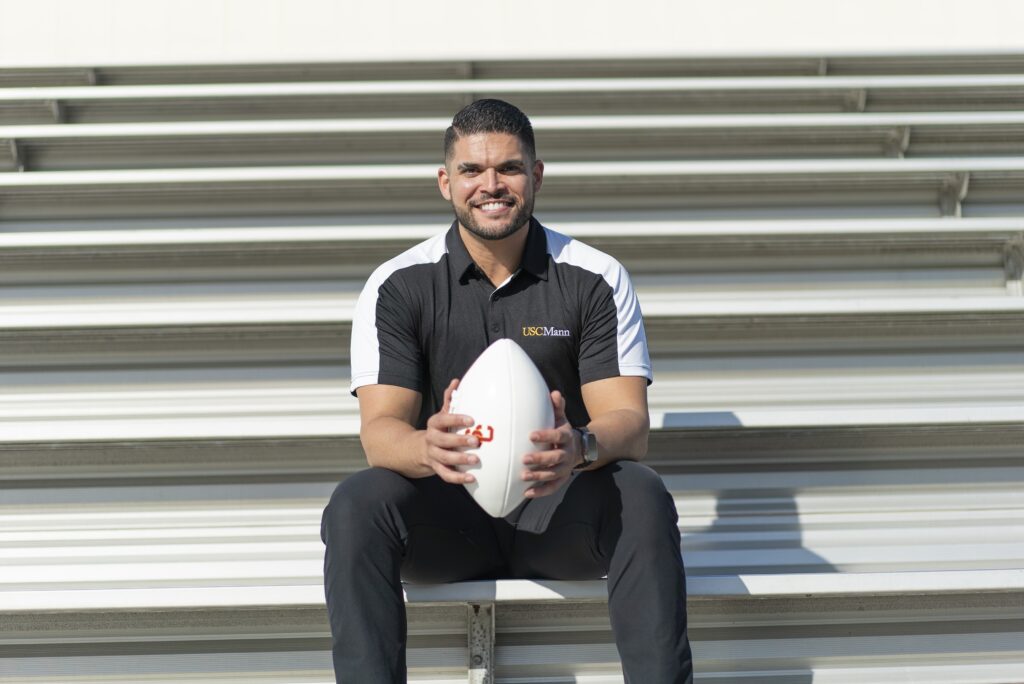
As Los Angeles prepares for the 2028 Summer Olympics, USC is providing a prescription for healthier athletes and athletic programs.
The USC Mann School of Pharmacy and Pharmaceutical Sciences is integrating sports pharmacy into its curriculum and creating a 12-credit certificate for practicing pharmacists that is anticipated to be the first national certification in the specialty. Courses cover subjects including dietary supplements, physical assessments and drug management. The school also offers experience-building rotations in interprofessional sports pharmacy ambulatory care and athlete-centric community pharmacy.
USC Mann’s Sports Pharmacy Program fills a significant knowledge gap, since this new yet burgeoning specialty has few pharmacists fully qualified to address the unique medication concerns of athletes. These range from enabling players to make well-informed choices about over-the-counter treatments and identifying potential drug side effects to avoiding inadvertent doping.
“We’re looking into the future and meeting a need,” says Senior Associate Dean for Academic and Student Affairs Kari Franson, who took the lead in developing the school’s sports pharmacy playbook. The program builds upon recommendations from the World Health Organization and National Academy of Medicine that sports organizations employ interprofessional healthcare teams—to which pharmacists are essential.
The school recently hired Michael Kessler—a 2021 USC Mann PharmD alumnus who also holds a master’s in kinesiology and exercise science and an undergraduate degree in human exercise physiology—to teach in the school’s Sports Pharmacy Program and serve on the USC Athletics interprofessional medical team.
“This is a dream job come true,” says Kessler, whose experience includes working with the Los Angeles Chargers. “It became clear to me when previously working with athletes that the expertise of a pharmacist was sorely needed, and I chose to become a pharmacist to meet this need.”
Three Elective Courses Offered
The certification builds upon the success of the school’s first sports pharmacy elective course, which started in January 2023. Second- and third-year pharmacy students now have the opportunity to take the three following courses:
- PHRD 640: Sports Pharmacy – Students will be connected with sports pharmacists, sports scientists and other health professionals who are working in the growing specialty of sports pharmacy. Students will explore how the sports pharmacy practice can be incorporated into their future careers.
- PHRD 641: Focused Sports Physical Assessment and Drug Management – This course focuses on screenings and physical assessments related to sports injuries or sports-related situations. Students will master clinical skills during pharmacist-athlete conversations, especially when it comes to counseling about self-treatment with non-prescription drugs and interpretation of anti-doping policies.
- PHRD 599: Sports and Dietary Supplements – Students will gain insight on the dietary supplements market and regulations, sports supplements and associated risks and how sports pharmacists can help athletes become well-informed consumers and reduce the risk of inadvertent doping when using these products.
Partnering with USC Athletics
The program also builds upon the Mann School’s longstanding partnership supporting USC Athletics. Kari Trotter Wall—director of pharmacy at the USC Pharmacy—has teamed with USC Athletics since 2004. Her service includes providing vaccinations, helping staff maintain on-site, over-the-counter medications, being on site for every home football game and consulting with athletes at the pharmacy.
World-renowned sports pharmacy expert Ashley Anderson is another key player in the program. A pioneer in clinical sports pharmacy and an expert in antidoping, Anderson founded the International Sports Pharmacists Network (ISPN) to develop sports pharmacy as a specialty practice. In addition, she served as lead author of the influential 2022 report Sports Pharmacy Practice and Education: A Global Overview, published by the International Pharmaceutical Federation.
“Sports pharmacists are advocates for athletes’ long-term health, optimizing medications for performance today and thinking of their future beyond the athletic career,” Anderson says. “We often act as the goalie on the team—the final check before an athlete takes a medication.”
ISPN is also partnering with the Mann School in modeling clinical sports pharmacy opportunities for athletic departments and the training needed for pharmacists to be effective in this role. “Our school will ultimately become a global hub for training and accrediting sports pharmacy specialists,” Franson says.
“The new Sports Pharmacy Program combines the Mann School’s top-ranked excellence in pharmacy education and innovation with the experiential opportunities presented by USC’s championship Trojan athletics teams,” says Dean Vassilios Papadopoulos, who is contributing his expertise on steroids to the curriculum.
An All-Out Push
Faculty and students will also collaborate on research to optimize athletes’ performance and well-being. This work could generate new knowledge about methods to recognize and deter doping, the actions and interactions of medications and supplements, preserving mental health, enhancing nutrition and food safety, the impact of drugs on exertion, the effects of steroids on reproductivity, and the results of cannabis use.
USC Mann’s sports pharmacy initiative will be a community resource as well, educating the public and raising awareness about the risk of recreational use of performance-enhancement products and how best to maintain health.
“We plan to make an all-out push to ensure every athlete in the Los Angeles region is able to locate and consult with a qualified sports pharmacist,” says Franson of the program’s impact. But as the Mann School keeps building sports pharmacy expertise in current and future pharmacists, the program’s benefits will be felt among athletes everywhere.
Questions? For more information and to receive future updates about the USC Mann Sports Pharmacy Certification Program, please fill out this form.


